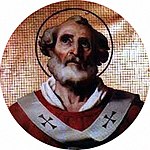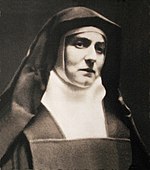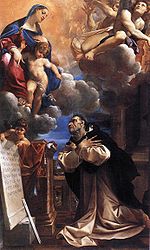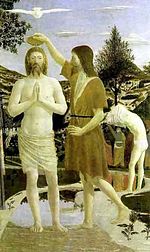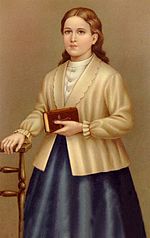Portal:Catholic Church/Patron Archive/August
Patron Archive
January - February - March - April - May - June - July - August - September - October - November - December
Today is Tuesday, December 3, 2024; it is now 19:17 UTC
Alphonsus Maria de Liguori, CSsR (27 September 1696 – 1 August 1787) was an Italian Catholic bishop and saint, as well as a spiritual writer, composer, musician, artist, poet, lawyer, scholastic philosopher, and theologian. He founded the Congregation of the Most Holy Redeemer, known as the Redemptorists, in November 1732.
In 1762 he was appointed Bishop of Sant'Agata dei Goti. A prolific writer, he published nine editions of his Moral Theology in his lifetime, in addition to other devotional and ascetic works and letters. Among his best known works are The Glories of Mary and The Way of the Cross, the latter still used in parishes during Lenten devotions. (Full article...)
Attributes: -
Patronage: confessors, moralists, theologians, vocations
Peter Julian Eymard S.S.S. (French: Pierre-Julien Eymard [pjɛʁ ʒyljɛ̃ ɛjmɑʁ]; 4 February 1811 – 1 August 1868) was a French Catholic priest and the founder of two religious institutes: the Congregation of the Blessed Sacrament for men and the Servants of the Blessed Sacrament for women. (Full article...)
Attributes: Eucharist, Monstrance, Eucharistic Adoration, Eucharistic Congress, Cope, Humeral Veil, Congregation of the Blessed Sacrament, Servants of the Blessed Sacrament, Real Presence
Patronage: -
See also: Eusebius of Vercelli; Peter Faber
Nicodemus (/nɪkəˈdiːməs/; Ancient Greek: Νικόδημος, romanized: Nikódēmos; Imperial Aramaic: 𐡍𐡒𐡃𐡉𐡌𐡅𐡍, romanized: Naqdīmūn; Hebrew: נַקְדִּימוֹן, romanized: Naqdīmōn) is a New Testament figure venerated as a saint in a number of Christian traditions. He is depicted as a Pharisee and a member of the Sanhedrin who is drawn to hear Jesus's teachings. As is the case with Lazarus, Nicodemus is not mentioned in the synoptic Gospels, and is mentioned only by John, who devotes more than half of Chapter 3 of his gospel and a few verses of Chapter 7 to Nicodemus, and lastly mentions him in Chapter 19.
Nicodemus is considered by both Catholic and Eastern Orthodox Church traditions to have secretly been a disciple of Jesus on the basis of the narrative in John 19; there is no explicit mention of his discipleship in the Gospel of John. Owing to his insistence on a hearing for Jesus according to Jewish law, Nicodemus is sometimes referred to as "defender of Jesus". (Full article...)
Attributes: Pharisee
Patronage: Curiosity
See also: Abāmūn of Tarnūt
John Vianney (born Jean-Marie Vianney and later Jean-Marie-Baptiste Vianney; 8 May 1786 – 4 August 1859) was a French Catholic priest often referred to as the Curé d'Ars ("the parish priest of Ars"). He is known for his priestly and pastoral work in his parish in Ars, France, resulting in the radical spiritual transformation of the community and its surroundings.
Catholics note his saintly life, mortification, persevering ministry in the sacrament of confession, and ardent devotion to the Blessed Virgin Mary. He was canonized in 1925 and his feast day is August 4. He is the patron saint of parish priests. (Full article...)
Attributes: -
Patronage: parish priests; Personal Apostolic Administration of Saint John Mary Vianney; Archdiocese of Dubuque; confessors; Archdiocese of Kansas City
Saint Afra (died 304) was martyred during the Diocletian persecution. Along with Saint Ulrich & St Simpert, she is a patron saint of Augsburg. Her feast day is August 7. Afra was dedicated to the service of the goddess Venus by her mother, Hilaria. Through his teachings, Bishop Narcissus converted Afra and her family to Christianity. When it was learned that Afra was a Christian, she was brought before Diocletian and ordered to sacrifice to the pagan gods. She refused and was condemned to death by fire. (Full article...)
Attributes: depicted being burnt to death
Patronage: Augsburg; converts; martyrs; penitent women
See also: Abel of Reims
Pope Hormisdas (/hɔːrˈmɪzdəs/; c. 450 – 6 August 523) was the bishop of Rome from 20 July 514 to his death. His papacy was dominated by the Acacian schism, started in 484 by Acacius of Constantinople's efforts to placate the Monophysites. His efforts to resolve this schism were successful, and on 28 March 519, the reunion between Constantinople and Rome was ratified in the cathedral of Constantinople before a large crowd. (Full article...)
Attributes: -
Patronage: -
See also: Pope Sixtus II
Albert of Trapani (born Albert degli Abati; Sicilian: Sant’Albertu di l’Abati; c. 1240 – 7 August 1307) was an Italian Roman Catholic priest and a professed member of the Carmelites. He practiced great austerities upon himself to make himself poor in the spirit of Jesus Christ and went out preaching and evangelizing; he was known for working and maintaining a positive relationship with Jews as well as for his powers of healing. The saint was likewise attributed for the 1301 lifting of the siege in Messina that could have seen hundreds die from starvation had it not been for his intervention. (Full article...)
Attributes: Lily; Book; The Devil; Depicted with Saint Angelus; Carmelite habit
Patronage: Trapani; Carmelite order; Carmelite schools; Palermo
See also: Saint Cajetan
Saint Dominic, OP (Spanish: Santo Domingo; 8 August 1170 – 6 August 1221), also known as Dominic de Guzmán (Spanish: [ɡuθˈman]), was a Castilian Catholic priest and the founder of the Dominican Order. He is the patron saint of astronomers and natural scientists, and he and his order are traditionally credited with spreading and popularizing the rosary. He is alternatively called Dominic of Osma, Dominic of Caleruega, and Domingo Félix de Guzmán. (Full article...)
Attributes: Chaplet; dog; star; lilies; Dominican Order Habit; book and staff; tonsure
Patronage: Astronomy; astronomers; Dominican Republic; falsely accused people; Santo Domingo Indian Pueblo; scientists
See also: Four Crowned Martyrs; Bonifacia Rodríguez y Castro, Spain; Mary MacKillop
Edith Stein OCD (in religion Teresa Benedicta of the Cross; 12 October 1891 – 9 August 1942) was a German Jewish philosopher who converted to Catholicism and became a Discalced Carmelite nun. Edith Stein was murdered in the gas chamber at Birkenau on 9 August 1942, and is canonized as a martyr and saint of the Catholic Church; she is also one of six patron saints of Europe.
Stein was born into an observant Jewish family, but had become an agnostic by her teenage years. Moved by the tragedies of World War I, in 1915, she took lessons to become a nursing assistant and worked in an infectious diseases hospital. After completing her doctoral thesis at the University of Freiburg in 1916, she obtained an assistantship there to Edmund Husserl. (Full article...)
Attributes: Yellow Star of David on a Discalced Carmelite nun's habit, flames, a book
Patronage: Europe; loss of parents; converted Jews; martyrs; World Youth Day
See also: Candida Maria of Jesus
Saint Lawrence or Laurence (Latin: Laurentius, lit. "laurelled"; 31 December 225 – 10 August 258) was one of the seven deacons of the city of Rome under Pope Sixtus II who were martyred in the persecution of the Christians that the Roman emperor Valerian ordered in 258. (Full article...)
Attributes: Usually holding a gridiron and wearing a dalmatic
Patronage: Rome, Rotterdam (Netherlands), Huesca (Spain), San Lawrenz, Gozo and Birgu (Malta), Barangay San Lorenzo San Pablo (Philippines), Canada, Sri Lanka, comedians, archivists, librarians, students, miners, tanners, chefs, Balagtas, Bulacan, Balangiga, Eastern Samar, roasters, poor, firefighters
See also: Nicola Saggio
Chiara Offreduccio (16 July 1194 – 11 August 1253), known as Clare of Assisi (sometimes spelled Clara, Clair or Claire; Italian: Chiara d'Assisi), is an Italian saint who was one of the first followers of Francis of Assisi.
Inspired by the teachings of St. Francis, she founded the Order of Poor Ladies, a monastic religious order for women in the Franciscan tradition. The Order of Poor Ladies was different from any other order or convent because it followed a rule of strict poverty. Clare wrote their Rule of Life, the first set of monastic guidelines known to have been written by a woman. Following her death, the order she founded was renamed in her honor as the Order of Saint Clare, commonly referred to today as the Poor Clares. Her feast day is on 11 August. (Full article...)
Attributes: Monstrance, pyx, lamp, habit of the Poor Clares
Patronage: Eye disease, goldsmiths, laundry, television, good weather, needleworkers; Santa Clara, California; Santa Clarita, California; Santa Clara Pueblo, New Mexico; Obando, Bulacan, Philippines
See also: Philomena
Jane Frances de Chantal, VHM (born Jeanne-Françoise Frémyot, Baroness of Chantal; 28 January 1572 – 13 December 1641) was a French Catholic noble widow and nun who was beatified in 1751 and canonized in 1767. She founded the Order of the Visitation of Holy Mary. The religious order accepted women who were rejected by other orders because of poor health or age.
When people criticized her, Chantal famously said, "What do you want me to do? I like sick people myself; I'm on their side." During its first eight years, the new order also was unusual in its public outreach, in contrast to most female religious who remained cloistered and adopted strict ascetic practices. (Full article...)
Attributes: Black religious habit with a silver cross necklace
Patronage: forgotten people; in-law problems; loss of parents; parents separated from children; widows
Pope Pontian (Latin: Pontianus; died October 235) was the bishop of Rome from 21 July 230 to 28 September 235. In 235, during the persecution of Christians in the reign of the Emperor Maximinus Thrax, Pontian was arrested and sent to the island of Sardinia.
He abdicated to make the election of a new pope possible. Resigning on 28 September 235, he was the first pope to do so. This allowed an orderly transition in the Church of Rome and so ended a schism that had existed in the Church for eighteen years. Some accounts say he was beaten to death only weeks after his arrival on Sardinia. (Full article...)
Attributes: -
Patronage: -
See also: Hippolytus of Rome; Maximus the Confessor; Gertrude of Aldenberg; John Berchmans, Belgium; Benildus Romançon, France; Irmã Dulce, Brazil
Maximilian Maria Kolbe OFMConv (born Raymund Kolbe; Polish: Maksymilian Maria Kolbe; 8 January 1894 – 14 August 1941) was a Polish Catholic priest and Conventual Franciscan friar who volunteered to die in place of a man named Franciszek Gajowniczek in the German death camp of Auschwitz, located in German-occupied Poland during World War II. He had been active in promoting the veneration of the Immaculate Virgin Mary, founding and supervising the monastery of Niepokalanów near Warsaw, operating an amateur-radio station (SP3RN), and founding or running several other organizations and publications. (Full article...)
Attributes: Christian Martyrdom, Prison uniform, needle being injected into an arm, the number 16670
Patronage: families, imprisoned people, journalists, political prisoners, prisoners, pro-life movement, Esperantists, Militia Immaculatae
See also: Saint Meinhard, Germany; Martyrs of Otranto; Domingo Ibáñez de Erquicia
The Assumption of Mary is one of the four Marian dogmas of the Catholic Church. Pope Pius XII defined it on 1 November 1950 in his apostolic constitution Munificentissimus Deus as follows:
It leaves open the question of whether Mary died or whether she was raised to eternal life without bodily death. (Full article...)
Attributes: -
Patronage: -
Stephen I, also known as King Saint Stephen (Hungarian: Szent István király [ˌsɛnt ˈiʃtvaːn kiraːj]; Latin: Sanctus Stephanus; Slovak: Štefan I. or Štefan Veľký; c. 975 – 15 August 1038), was the last grand prince of the Hungarians between 997 and 1000 or 1001, and the first king of Hungary from 1000 or 1001 until his death in 1038. The year of his birth is uncertain, but many details of his life suggest that he was born in, or after, 975, in Esztergom. He was given the pagan name Vajk at birth, but the date of his baptism is unknown. He was the only son of Grand Prince Géza and his wife, Sarolt, who was descended from a prominent family of gyulas. Although both of his parents were baptized, Stephen was the first member of his family to become a devout Christian. He married Gisela of Bavaria, a scion of the imperial Ottonian dynasty. (Full article...)
Attributes: Crown; Sceptre; globe
Patronage: Patron saint of Hungary; Patron of kings, masons, stonecutters, stonemasons and bricklayers; Protector against child death
Hyacinth (Polish: Święty Jacek or Jacek Odrowąż; c. 1185 – 15 August 1257) was a Polish Dominican priest and missionary who worked to reform the women's monasteries in his native Poland. Educated in Paris and Bologna, he was a Doctor of Sacred Studies. (Full article...)
Attributes: statue of the Blessed Virgin Mary; Monstrance or Ciborium
Patronage: Lithuania, University of Santo Tomas-College of Tourism and Hospitality Management, invoked by those in danger of drowning; Basilica of St. Hyacinth
See also: Clare of Montefalco; Beatrice of Silva; Jeanne Delanoue, France; Jacobo Kyushei Tomonaga, Japan
Alberto Hurtado, SJ (Latin American Spanish: [alˈβeɾto wɾˈtaðo]; born Luis Alberto Hurtado Cruchaga; January 22, 1901 – August 18, 1952), popularly known as Padre Hurtado, was a Chilean Jesuit priest, lawyer, social worker, and writer of Basque ancestry. He founded the Hogar de Cristo foundation in 1944.
Hurtado was canonized on October 23, 2005, by Pope Benedict XVI, becoming his country's second saint. (Full article...)
Attributes: Jesuit robes, an old green van
Patronage: Chile, poor people, street children, social workers, a class patron in Xavier School
John Eudes, CIM (French: Jean Eudes; 14 November 1601 – 19 August 1680) was a French Catholic priest and the founder of both the Order of Our Lady of Charity in 1641 and Congregation of Jesus and Mary, also known as The Eudists, in 1643. He was also a professed member of the Oratory of Jesus until 1643. (Full article...)
Attributes: Priest's attire, Sacred Heart
Patronage: Eudists; Order of Our Lady of Charity; Diocese of Baie-Comeau; Missionaries
See also: Ezequiél Moreno y Díaz, Colombia
Bernard of Clairvaux, O.Cist. (Latin: Bernardus Claraevallensis; 1090 – 20 August 1153), venerated as Saint Bernard, was an abbot, mystic, co-founder of the Knights Templar, and a major leader in the reform of the Benedictines through the nascent Cistercian Order.
He was sent to found Clairvaux Abbey only a few years after becoming a monk at Cîteaux. In the year 1128, Bernard attended the Council of Troyes, at which he traced the outlines of the Rule of the Knights Templar, which soon became an ideal of Christian nobility. (Full article...)
Attributes: -
Patronage: Cistercians, Burgundy, beekeepers, candlemakers, Gibraltar, Algeciras, Queens' College, Cambridge, Speyer Cathedral, Knights Templar
See also: Bernardo Tolomei; Maria De Mattias
Pope Pius X (Italian: Pio X; born Giuseppe Melchiorre Sarto; 2 June 1835 – 20 August 1914) was head of the Catholic Church from 4 August 1903 to his death. Pius X is known for vigorously opposing modernist interpretations of Catholic doctrine, and for promoting liturgical reforms and Thomist scholastic theology. He initiated the preparation of the 1917 Code of Canon Law, the first comprehensive and systemic work of its kind, which would ultimately be promulgated by his successor. He is venerated as a saint in the Catholic Church. (Full article...)
Attributes: -
Patronage: Society of Saint Pius X; Archdiocese of Atlanta, Georgia; Diocese of Des Moines, Iowa; first communicants; Diocese of Great Falls-Billings, Montana; Archdiocese of Kottayam, India; Esperantists; pilgrims; Santa Luċija, Malta; Diocese of Springfield-Cape Girardeau, Missouri; Archdiocese of Zamboanga, Philippines; emigrants from Treviso; Patriarchy of Venice; Catechists; St. Pius X Seminary (Dubuque, Iowa)
See also: Sidonius Apollinaris
Symphorian (Symphorianus, Symphorien), Timotheus (Timothy), and Hippolytus of Rome are three Christian martyrs who, though they were unrelated and were killed in different places and at different times, shared a common feast day in the General Roman Calendar from at least the 1568 Tridentine calendar to the Mysterii Paschalis. While still a young man, Symphorian was either beheaded or beaten to death with clubs. (Full article...)
Attributes: young man being dragged to martyrdom while his mother encourages him.
Patronage: Autun; children; students; against eye problems, against syphilis
See also: John Kemble, England
Rose of Lima, TOSD (born Isabel Flores de Oliva; 20 April 1586 – 24 August 1617) (Latin: Rosa Limana, Spanish: Rosa de Lima) was a member of the Third Order of Saint Dominic in Lima, Peru, Spanish Empire, who became known for both her life of severe penance and her care of the poverty stricken of the city through her own private efforts.
Rose of Lima was born to a noble family and is the patron saint of embroidery, gardening and cultivation of blooming flowers. She was the first person born in the Americas to be canonized as a saint. (Full article...)
Attributes: rose, anchor, Infant Jesus
Patronage: embroiderers; sewing lace; gardeners; florists; Latin America; people ridiculed or misunderstood for their piety; for the resolution of family quarrels; indigenous peoples of the Americas; Peru; Philippines; Villareal; Santa Rosa, California; Santa Rosa, Laguna; Santa Rosa, Nueva Ecija; Alcoy, Cebu; Arima, Trinidad and Tobago; against vanity; Lima; Sittard
Bartholomew was one of the twelve apostles of Jesus according to the New Testament. Most scholars today identify Bartholomew as Nathanael, who appears in the Gospel of John (1:45–51; cf. 21:2). (Full article...)
Attributes: Knife and his flayed skin, Red Martyrdom
Patronage: Armenia; bookbinders; butchers; Florentine cheese and salt merchants; Gambatesa, Italy; Catbalogan, Samar; Malabon, Metro Manila; Nagcarlan, Laguna, Philippines; Għargħur, Malta; neurological diseases; plasterers; tanners and leather workers; shoemakers; curriers; trappers; twitching; whiteners ; Los Cerricos (Spain)
See also: Emily de Vialar, France; Jeanne-Antide Thouret, France
Louis IX (25 April 1214 – 25 August 1270), also known as Saint Louis, was King of France from 1226 until his death in 1270. He is widely recognized as the most distinguished of the Direct Capetians. Following the death of his father, Louis VIII, he was crowned in Reims at the age of 12. His mother, Blanche of Castile, effectively ruled the kingdom as regent until he came of age and continued to serve as his trusted adviser until her death. During his formative years, Blanche successfully confronted rebellious vassals and championed the Capetian cause in the Albigensian Crusade, which had been ongoing for the past two decades.
As an adult, Louis IX grappled with persistent conflicts involving some of the most influential nobles in his kingdom, including Hugh X of Lusignan and Peter of Dreux. Concurrently, England's Henry III sought to reclaim the Angevin continental holdings, only to be decisively defeated at the Battle of Taillebourg. Louis expanded his territory by annexing several provinces, including parts of Aquitaine, Maine, and Provence. Keeping a promise he made while praying for recovery from a grave illness, Louis led the ill-fated Seventh and Eighth Crusades against the Muslim dynasties that controlled North Africa, Egypt, and the Holy Land. He was captured and ransomed during the Seventh Crusade, and later succumbed to dysentery during the Eighth Crusade. His son, Philip III, succeeded him. (Full article...)
Attributes: Depicted as King of France, generally with a crown, holding a sceptre with a fleur-de-lys on the end, possibly with blue clothing with a spread of white fleur-de-lys (coat of arms of the French monarchy)
Patronage: France, French monarchy, Third Order of St. Francis, Archdiocese of New Orleans, Roman Catholic Diocese of Port-Louis, hairdressers; passementiers (lacemakers)
See also: Joseph Calasanz, Spain; Maria Micaela Desmaisieres, Spain
Teresa Jornet Ibars, HAD (9 January 1843 – 26 August 1897), also known as Saint Teresa of Jesus, was a Spanish Catholic professed religious and the founder of the Little Sisters of the Abandoned Elderly.
Ibars was the great-niece of Francisco Palau and a friend and confidante of Saturnino López Novoa. Her dedication to the old and ill was noted, and her sisters' work in Spain and later abroad. (Full article...)
Attributes: Religious habit
Patronage: Little Sisters of the Abandoned Elderly; People rejected by religious orders; Elderly people
See also: David Lewis, England; Joan Elizabeth Bichier des Âges, France; Mariam Baouardy
Monica (c. 332 – 387) was an early North African Christian saint and the mother of Augustine of Hippo. She is remembered and honored in the Catholic and Orthodox Churches, albeit on different feast days, for her outstanding Christian virtues, particularly the suffering caused by her husband's adultery, and her prayerful life dedicated to the reformation of her son, who wrote extensively of her pious acts and life with her in his Confessions. Popular Christian legends recall Monica weeping every night for her son Augustine. (Full article...)
Attributes: -
Patronage: patience, wives, mothers, and abuse victims
See also: Caesarius of Arles, France
Augustine of Hippo (/ɔːˈɡʌstɪn/ aw-GUST-in, US also /ˈɔːɡəstiːn/ AW-gə-steen; Latin: Aurelius Augustinus Hipponensis; 13 November 354 – 28 August 430), also known as Saint Augustine, was a theologian and philosopher of Berber origin and the bishop of Hippo Regius in Numidia, Roman North Africa. His writings deeply influenced the development of Western philosophy and Western Christianity, and he is viewed as one of the most important Church Fathers of the Latin Church in the Patristic Period. His many important works include The City of God, On Christian Doctrine, and Confessions. (Full article...)
Attributes: child; dove; pen; shell, pierced hear
Patronage: brewers; printers; sore eyes; theologians; Bridgeport, Connecticut; Cagayan de Oro, Philippines; Ida, Philippines; Kalamazoo Michigan; Saint Augustine, Florida; Superior, Wisconsin; Tucson, Arizona
See also: Edmund Arrowsmith; Joaquina Vedruna de Mas, Spain
John the Baptist (c. 1st century BC – c. AD 30) was a Jewish preacher active in the area of the Jordan River in the early 1st century AD. He is also known as Saint John the Forerunner in Eastern Orthodoxy and Oriental Orthodoxy, John the Immerser in some Baptist Christian traditions, and Prophet Yahya in Islam. He is sometimes alternatively referred to as John the Baptiser.
John is mentioned by the Roman Jewish historian Josephus, and he is revered as a major religious figure in Christianity, Islam, the Baháʼí faith, the Druze faith, and Mandaeism; in the last of these he is considered to be the final and most vital prophet. He is considered to be a prophet of God by all of the aforementioned faiths, and is honoured as a saint in many Christian denominations. According to the New Testament, John anticipated a messianic figure greater than himself; in the Gospels, he is portrayed as the precursor or forerunner of Jesus. According to the Gospel of Matthew, Jesus himself identifies John as "Elijah who is to come", which is a direct reference to the Book of Malachi (Malachi 4:5), as confirmed by the angel who announced John's birth to his father, Zechariah. According to the Gospel of Luke, John and Jesus were relatives. (Full article...)
Attributes: Cross, lamb, his own head
Patronage: patron saint of Quebec, Puerto Rico, Knights Hospitaller of Jerusalem, Florence, Genoa, many other places
Narcisa de Jesús Martillo Morán (29 October 1832 – 8 December 1869) was an Ecuadorian virgin and Dominican tertiary in the Roman Catholic Church. Martillo was known for her charitable giving and strict devotion to Jesus Christ while living a virginal and austere life of prayer and penance. Her devotion to prayer and the mortification of the flesh was strong and it led her to the decision to live as a member of the Third Order of Saint Dominic in Patrocínio (Peru), where she died on 8 December 1869. Narcisa de Jesús was beatified on 25 October 1992. (Full article...)
Attributes: -
Patronage: -
See also: Saint Pammachius; Anne Line, England; Margaret Clitherow, England; Margaret Ward, England; Euphrasia Eluvathingal, India; Jeanne Jugan, France
Aidan of Lindisfarne (Irish: Naomh Aodhán; died 31 August 651) was an Irish monk and missionary credited with converting the Anglo-Saxons to Christianity in Northumbria. He founded a ministry cathedral on the island of Lindisfarne, known as Lindisfarne Priory, served as its first bishop, and travelled ceaselessly throughout the countryside, spreading the gospel to both the Anglo-Saxon nobility and the socially disenfranchised (including children and slaves).
He is known as the Apostle of Northumbria and is recognised as a saint by the Catholic Church, the Eastern Orthodox Church, the Anglican Communion, and others. (Full article...)
Attributes: Monk holding a flaming torch; stag
Patronage: Northumbria; Firefighters






